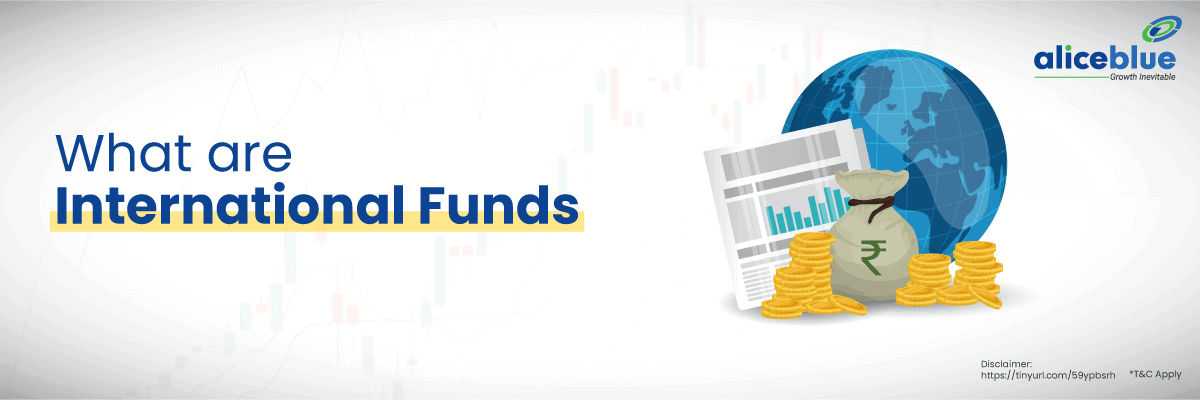International funds are mutual funds that invest in companies outside the investor’s home country. These funds give you access to global economies and help you diversify your investments beyond domestic markets. By putting money into international funds, people can explore a wider range of investment options and possibly reduce the risks that come with the changing economy of their home country. Additionally, these funds can offer exposure to foreign currencies, which can be beneficial if the investor’s home currency is depreciating.
International Funds India Meaning
In the Indian context, international funds refers to mutual funds that primarily invest in equities and debt instruments of companies and governments located outside of India. With these funds, Indian investors can invest in markets all over the world, not just in Indian stocks and bonds. Investing in international funds can help mitigate risks associated with the domestic economy and capitalize on growth opportunities in other countries.
International Funds Example
Let’s take an example to get a better understanding of international funds. Suppose Mr. Sharma, an investor from Mumbai, decides to invest in an international fund that focuses on the technology sector in the USA. By doing so, he gains exposure to companies like Apple, Google, and Microsoft. So, even though these tech giants are not listed on Indian stock exchanges, Mr. Sharma can still benefit from their growth.
Types of International Funds
International funds, designed to offer investors a gateway to global markets, come in various flavors, each catering to specific investment objectives and risk appetites. Here’s a deeper dive into the diverse types of international funds:
- Global Funds: These funds truly embrace the ‘global’ tag. They invest in equities and debt instruments from across the world, including the investor’s own country. This wide net ensures a balanced exposure, capturing the growth of both emerging and developed markets. For an Indian investor, this means the fund could have holdings in Indian companies as well as giants like Apple or Samsung.
- Regional Funds: As the name suggests, these funds focus on a specific geographic region. For example, an Asian fund would only put money into companies in Asian countries, not in the investor’s home country. This lets investors take advantage of things like the tech boom in Southeast Asia or the growth of the industrial sector in Europe.
- Country Funds: These are laser-focused funds that invest exclusively in a single foreign country. An investor bullish on the Chinese tech sector or the Brazilian manufacturing industry might opt for a China or Brazil country fund, respectively. Due to concentrated exposure, the rewards can be big, but the risks are also high because the fund’s performance is tied to the health of the economy of just one country.
- Sector-specific Funds: These funds work across borders but only in certain areas. Whether it’s technology, healthcare, or renewable energy, sector-specific international funds invest in leading companies of a particular sector, irrespective of their geographic location. This allows investors to tap into global sectoral trends, like the electric vehicle revolution or advancements in biotechnology.
A global fund gives investors a broad view of markets around the world. Regional, country, and sector-specific funds, on the other hand, let investors focus on specific regions or industries. The choice comes down to how sure the investor is, how much risk he or she is willing to take, and how much diversification he or she wants.
How To Invest In International Mutual Funds?
Investing in international mutual funds gives investors a chance to diversify their portfolio beyond domestic markets and tap into the growth potential of foreign economies. Here is a step-by-step guide to help Indian investors figure out how to invest in international mutual funds:
- Research and Identify the Right Fund: Begin by understanding your investment goals and risk tolerance. Are you looking for diversification, or are you bullish about a specific region or sector? Various financial platforms and websites like Alice Blue provide detailed analyses, ratings, and reviews of international mutual funds available to Indian investors.
- Choose the Investment Mode: Investors can opt for a lump sum investment or a Systematic Investment Plan (SIP). While a lump sum involves investing a significant amount at once, a SIP allows you to invest a fixed sum at regular intervals, making it more manageable and harnessing the power of rupee cost averaging.
- Open an Investment Account: If you’re a first-time investor, you’ll need to open an account with a mutual fund house or through an investment platform. Ensure that the platform or fund house offers the international fund you’re interested in.
- Complete KYC Formalities: Before investing, you’ll need to complete your Know Your Customer (KYC) formalities. This involves submitting identity and address proofs, a PAN card, and a photograph. Many platforms offer e-KYC, making the process seamless and online.
- Invest Online or Offline: With your KYC in place and account set up, you can choose to invest online through the fund house’s website, a mutual fund app, or an online investment platform like Alice Blue. Alternatively, you can fill out physical forms and submit them to the mutual fund’s office or collection centers.
- Monitor Your Investment: Once invested, it’s essential to keep an eye on your portfolio. Different things like currency changes, geopolitical events, and regional economic trends can make international markets act differently than domestic ones.
- Redemption: When you decide to exit your investment or if you need funds, you can submit a redemption request. The amount, after accounting for any taxes or exit loads, will be credited to your bank account.
International Mutual Funds Taxation
The taxation on international mutual funds in India is treated similarly to debt funds. If the holding period is less than 3 years, the gains are considered as short-term and are taxed as per the investor’s income tax slab. For a holding period of more than 3 years, the gains are termed as long-term and are taxed at 20% with indexation benefits.
For example, if Ms. Rani from Chennai invests in an international fund and sells her units after 2 years with a gain of ₹50,000, this gain will be added to her income and taxed as per her income tax slab.
International Mutual Funds India
Diversifying one’s portfolio by investing in international markets can be a strategic move for Indian investors. It not only offers exposure to global economies but also helps in hedging against domestic market volatility. Here are some of the top-performing international mutual funds available for Indian investors:
| S.No. | International Mutual Funds | 1-Year Return (%) | 3-Year Return (%) | 5-Year Return (%) |
| 1. | ICICI Prudential US BlueChip Equity Direct-Plan-Growth | 27.58 | 16.71 | 14.72 |
| 2. | Franklin India Feeder Franklin US Opportunities Direct-Fund Growth | 21.33 | 6.45 | 11.09 |
| 3. | PGIM India Global Equity Opportunities Fund Direct-Growth | 25.67 | 4.28 | 13.08 |
| 4. | Nippon India US Equity Opportunities Fund Direct Growth | 21.22 | 11.96 | 12.56 |
| 5. | Invesco Global Equity Income FoF Direct-Growth | 32.11 | 17.07 | 9.59 |
Do you want to expand your knowledge about mutual funds? We’ve got a list of must-read blogs that will help you do just that. Just click on the articles to find out more.
What are International Funds – Quick Summary
- International Funds are mutual funds that invest in companies located outside the investor’s home country, offering a chance to diversify beyond domestic markets.
- In the Indian context, international funds invest in equities and debt instruments of entities outside of India, allowing Indian investors to tap into global markets.
- Examples of international funds include those focusing on specific sectors, such as technology in the USA, allowing investors to gain exposure to global giants like Apple and Google.
- Types of international funds include Global Funds (worldwide investments), Regional Funds (specific regions), Country Funds (single foreign country), and Sector-specific Funds (specific sectors across countries).
- Investing in international mutual funds involves researching the right fund, choosing the investment mode (lump sum or SIP), completing KYC formalities, and monitoring the investment.
- Taxation for international mutual funds in India is akin to debt funds. Short-term gains (less than 3 years) are taxed as per the individual’s tax slab, while long-term gains (more than 3 years) are taxed at 20% with indexation benefits.
- Some of the top-performing international mutual funds in India include ICICI Prudential US BlueChip Equity Direct-Plan-Growth, Franklin India Feeder Franklin US Opportunities Direct-Fund Growth, and PGIM India Global Equity Opportunities Fund Direct-Growth.
- Invest in top international funds with Alice Blue at no cost. We provide Margin Trade Funding facility, where you can use 4x margin to buy stocks i.e. you can buy stocks worth ₹ 10000 at just ₹ 2500.
International Mutual Funds India – FAQ
What are International Funds?
International funds are mutual funds that invest in the stocks and bonds of companies based in countries other than the investor’s home country.
What Are The Different Types Of International Funds?
Here are the 4 different types of international funds:
- Global Funds
- Regional Funds
- Country Funds
- Sector-specific Funds
Are International Funds A Good Investment?
International funds can be a good investment for those looking to diversify their portfolio beyond domestic markets. They offer exposure to global economies and can mitigate risks associated with the domestic economy.
Why Are International Funds Important?
International funds are crucial as they provide investors with an opportunity to diversify their investments, reduce risks associated with domestic markets, and tap into growth opportunities in global economies.
To gain a better understanding of the topic and access more information , explore the articles below that cover mutual funds, stock market insights, trading strategies, and organizational perspectives.”



